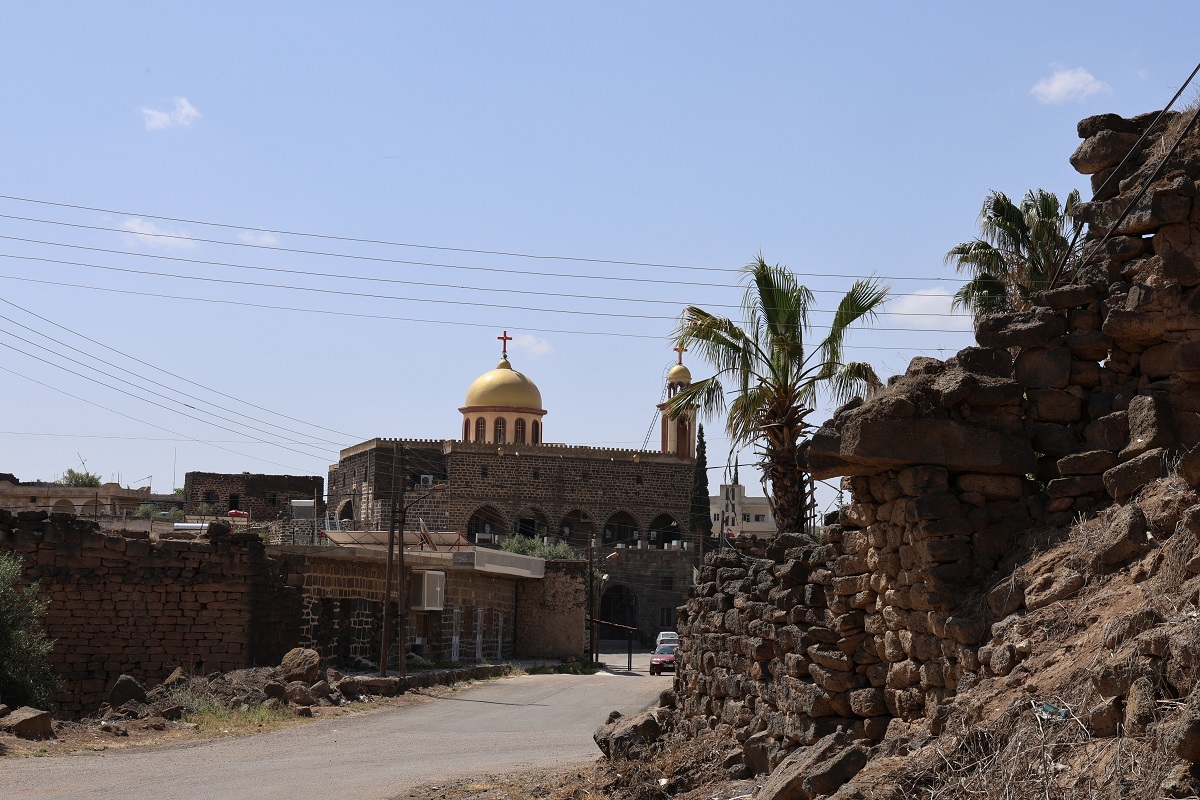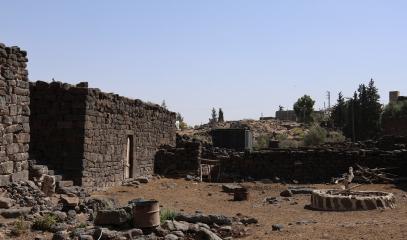The never-ending war south of Damascus: ‘We just want to live with dignity,’ says Sr Mona
The situation has not yet stabilised in the areas where fighting broke out recently between Druze militias and Islamist groups. The Christian village of Khabab was not directly involved, but faces an equally precarious situation due to drought and economic deprivation. The war “didn't end just because the regime was overthrown,” said Sister Mona of the Sisters of Charity of Saint Jeanne Anthida Thouret, speaking to AsiaNews. For her, “our hope is in the Lord, not in men.”
Khabab (AsiaNews) – “The war is not over,” said Sister Mona Dhem welcoming us. The 60-year-old is a member of the Missionaries of Charity of Saint Jeanne Antide Thouret in Khabab, a Christian village about 60 kilometres south of the Syrian capital Damascus.
Although the fighting between Druze militias and the armed groups that back the new Syrian regime led by Ahmed al-Sharaa did not reach the village, the nun admits that tensions are getting worse, complicated by Israeli air strikes, which Israel has justified by the desire to "protect" the Druze minority.
Indeed, the war is not over. “No, it is not over. It didn't end just because the regime was overthrown,” Sister Mona told AsiaNews.
“In December, for two or three days, Israeli planes bombed our entire region, hitting weapons depots. Now we hear planes sometimes at night and in the evening, sometimes during the day. We don't know what the future holds. We always hope, but our hope is in the Lord, not in men.”
The groups that fought each other last week in the province of Suweida, causing the death of about 100 people, plus some Bedouin groups backing the Islamist fanatics, have tried in recent days to implement the pacification deals signed by Druze religious leaders and the government, but these truces – supported, among others, by Lebanese Druze leader Walid Jumblatt, who met Sharaa recently – have so far proved to be precarious.
Although the roads to the city of Jaramana reopened, following fighting between 28 and 30 April, only student buses and a few local residents dare use them. People still fear that the situation could get worse again at any moment, as local sources told AsiaNews.
Khabab, a town known for its distinctive black basalt buildings, some of which date back to ancient times, comes under the Archeparchy of Bosra in the Daraa Governorate. It is part of an extensive agricultural area in the Hauran plain (which extends into Jordan). It is home to Christian and Bedouin families who grow cereal grains.
This year there was no rainfall and access to water is increasingly threatened by the presence of the Israeli army near important reservoirs.
In the last two days, Israel tripled its presence on the Golan Heights and established nine new positions inside Syrian territory.
“We were unable to sow this year, because of the drought," said the nun, who grew up in Khabab. "Irrigation depends on wells and therefore on rainfall. June-July is harvest time.”
What will you do if you have not sown? “Only God knows," Sister Mona replied, who, together with two other sisters, currently deals mainly with catechesis. The Sisters of Charity arrived in Khabab for the first time in 1958.
The unpredictability of the weather adds to an already extremely precarious economic situation.
In a short time, the prices of food and rent have soared bringing many families to their knees, partly because of Syrians returning from abroad in recent weeks.
“The price of bread has jumped from 400 to 4,000 (Syrian) pounds (SYP)," the sister explained. “Just to raise a child you need a million SYPs, equal to about 100 dollars a month. A family man, on the other hand, earns about 20 dollars. How is this possible? It is not easy. These are also the consequences of more than a decade of war.”
To avoid further inflation, the new authorities have imposed a ceiling of 50 dollars a week on bank withdrawals, restricting consumption even more.
In Khabab, however, at least relations between local minority groups are still good. “Every now and then there are disagreements with the Bedouins: thefts and small clashes over the possession of agricultural land. In general, however, we have a good relationship with Muslims because before the war the educated girls of our village went to work as teachers in Muslim villages. Indeed, they were very respected, and very happy.”
But things vary from region to region and city to city. “In some areas further south, Christians have abandoned villages inhabited by Muslims because they were afraid, but nothing has happened, at least for now.”
After fighting broke out between pro-Hayat Tahrir al-Sham (HTS) militias, first with the Alawites and then the Druze, many wonder which ethnic or religious group Islamist fanatics will target next.
Many people left the country during the war (Khabab’s population fell from 7,500 to about 3,000 today), a period that brings back painful memories even to Sister Mona, who worked in an elementary school for two years.
Due to the war, hundreds of pupils from Jaramana were taken to the Greek Catholic Patriarchate of Damascus:
“When bombs hit a school run by the Armenian church near ours, several children were killed. We immediately went to that school to support the families, the staff and try to stay with them. We were very close, really. War is terrible. It's terrible.
“Later, we went to the hospital to visit the hospitalised children, to find out if they needed blood donations. Even though I was scared, I didn't care. If there were bombs above our heads, I didn't care. We didn't think about ourselves, we lived for the children, for the people, really.”
"Today, we want to live, that's all,” Sister Mona said. “We just want to live with dignity. Whoever is in government, we don't care. For us, it makes no difference. As long as we can live, that is all that matters for us now.”
GATEWAY TO THE EAST IS THE ASIANEWS NEWSLETTER DEDICATED TO THE MIDDLE EAST. WOULD YOU LIKE TO RECEIVE IT EVERY TUESDAY? TO SUBSCRIBE, CLICK HERE.










.png)










